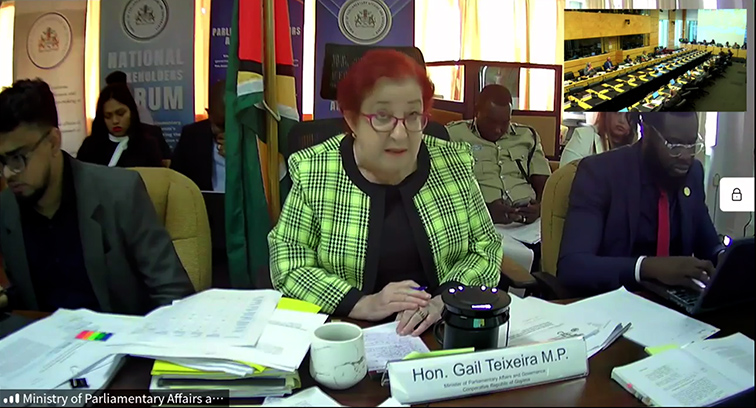Concerned that the institutional framework to combat corruption is not yet sufficiently strong and effective, the UN Human Rights Committee (CCPR) yesterday called on Guyana to take a raft of measures including protection of whistleblowers.
Guyana came under intense questioning on March 18-20 on its periodic report by the Geneva, Switzerland-based committee on the Convention on Civil and Political Rights (CCPR).
In its concluding observations yesterday, the Committee said that it took note of the adoption of several laws and regulations by the State party to combat corruption, along with measures such as the creation of a Special Organiz-ed Crime Unit for investigating financial crimes. However, the Committee said it remains concerned that the institutional framework to combat corruption is “not yet sufficiently strong and effective in practice to adequately prevent or prosecute corruption, including in the police force and of high-level public officials”. For example, the Committee said it is concerned about reports that: (a) the Com-missioner of Information does not address all requests from the public; and (b) the Protected Disclosures and Witness Protection Act has not yet entered into force.
The Guyana Government yesterday said that it submitted corrections and comments to the Committee’s concluding observations but that these were not included in the document issued. It disseminated what it said it had forwarded to the committee for inclusion in the concluding observations.
The Committee said that the State party should expand its efforts to adopt and implement, efficient, and prompt measures to promote good governance and battle corruption and impunity at all levels of government. In this respect, the Committee urges the State party to:
Adopt concrete measures to address the root causes of corruption as a matter of priority;
Ensure that all corruption cases, including cases of those involved in high- level corruption and corruption in police force, are independently and impartially investigated and prosecuted, and that perpetrators, if convicted, are sanctioned with penalties commensurate with the seriousness of the offence, and that victims receive full reparation;
Take the measures necessary to ensure, in practice, the independence, effectiveness, transparency, and accountability of all anti-corruption bodies, including the Auditor’s General Office, the Com-missioner of Information, the Integrity Commission, and the Public Procure-ment Commission;
Ensure that the right of access to information held by Commissioner of Information can be effectively exercised in practice;
Effectively protect whistle-blowers and witnesses through, inter alia, expediting the entry into force of Protected Disclosures and Witness Protection Act.
In its response in this section, Guyana said that it responded to issues raised by the Committee during the review and subsequently in additional information with data regarding the anti-corruption measures and cases before the courts.
Guyana added that it is satisfied that it has been recently reviewed under the Inter-American Convention against Corruption by MESICIC and its report was adopted on March 14, 2024. This report has so far not been released to the public. Guyana said that it had also submitted its 2nd Self-Assessment in 2023 and is awaiting the UN Convention Against Corruption onsite review. “Guyana proudly subjects itself to these mechanisms and their review processes, and will continue to do so”, the government here said.
The UN Human Rights Committee (HRC) said it is also concerned about reports of corruption, the lack of transparency and accountability in the management of natural resources, particularly in the oil and gas extractive sector. In this regard, the Committee said that it is concerned about reports of corruption by public officials in this sector, and the lack of information on measures taken to investigate such allegations.
Guyana also countered this in its response. It said “The State party responded to these allegations made during the review. Further the State party reported on the Natural Resource Fund Act and the Local Content Act and the legal framework for the management of oil revenue to Guyana. It also pointed out that it signed on to the EITI (Extractive Industries Transparency Initiative) and has brought its reports up to 2021. (The) 2022 report was due in December 2024. As well as currently under review by the Caribbean Financial Action Task Force …”
Guyana also stated that it was unaware of reports of acts of corruption in the oil sector.
The HRC also asserted in its concluding observations that Guyana should take all appropriate measures to ensure that the management of its natural resources is not subject to corruption.
“It should also ensure that government permits granted for the exploitation of natural resources and licenses to exploit oil fields undergo adequate prior environmental and societal impact assessments carried out in a systematic and transparent manner, with a meaningful participation of all affected communities. Furthermore, the State party should ensure prompt, thorough, independent, and impartial investigations into reports of corruption in awarding public contracts and prosecute, and if a person is convicted apply penalties commensurate with gravity of the crime”, the Committee said.
Guyana’s rejoinder to this observation was that it was not aware of corruption in the awarding of public contracts in this sector.
“The Audit Office and the Public Procurement Commission, both constitutional bodies, have the authority to investigate and where necessary recommend to the Director of Public Prosecutions to prosecute”, Guyana said.





